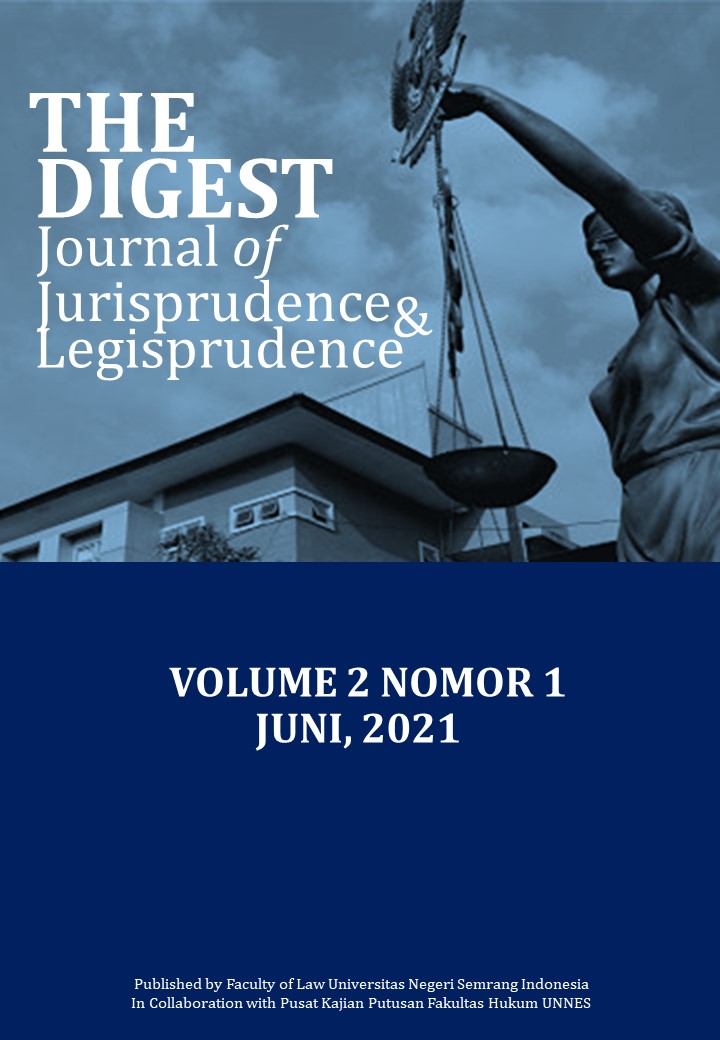The Extradition Agreement Between Indonesia and Australia: Case of Adrian Kiki Iriawan Extradition
Main Article Content
Abstract
Law is a tool to create justice and create peace of society. State money is something that must be accepted as a right for all Indonesian people, but many are misusing state money for their own benefit. Corruption is an extraordinary crime that harms the state, and hurts justice in society. Not only does it commit corruption, it is more sad that many corruptors are absent from the obligation to account for their actions. There are many ways by corruptors to escape the responsibility of prosecution, one of which is by fleeing to other countries. With the escape of the corruptor to another country, the country of origin experienced a huge loss. The first is because the person has caused material losses with a very large amount in which the money should be a right of the people of Indonesia, the second is to escape the corruptor to a foreign country of course this will hurt justice in the community because the corruptor can still live a comfortable life with the proceeds of the crime while many of the people who live in need. But what is wrong is still guilty and must get the punishment that should be in accordance with applicable regulations. It was not only the Indonesian people who condemned the Corruption Act, but the international community also began to pay attention to these actions. Extradition is an expression of the attention of the international community towards corruption. Extradition can be a solution in the event that the perpetrator escapes from his responsibility and runs away abroad, so that the person cannot be free from punishment. Adrian Kiki Iriawan is one of the Indonesian corruptors who escaped from his responsibilities and is hiding in a foreign country, he is a convict in the case of Bank Indonesia liquidity assistance, he used state funds amounting to 1.5 trillion for his own interests.
Article Details
All works published in The Digest: Journal of Jurisprudence and Legisprudence are licensed & copyrighted under a Creative Commons Attribution Attribution-ShareAlike 4.0 International. Under this license, the authors published in The Digest: Journal of Jurisprudence and Legisprudence retain the copyright. All other authors using the content of The Digest: Journal of Jurisprudence and Legisprudence are required to cite the author(s) and publisher in their work.
References
Arifin, R. (2014). Empowering International Cooperation’s Role in the Follow of Assets of Corruption's Result. Indonesian Journal of International Law, 11(3), 414-422.
Arifin, R. (2019). International Law Perspective on Mutual Legal Assistance Treaty in the Context of Assets Recovery. Semarang: BPFH UNNES.
Arifin, R. (2020). Hukum Internasional: Teori dan Berbagai Perkembangannya. Semarang: BPFH UNNES.
Arifin, R., Faridah, S., & Naefi, M. (2019). Misdemeanor of Corruption within the Scope of International Law and the Legal Consequences. JILS (Journal of Indonesian Legal Studies), 4(2), 299-314.
Arifin, R., Rodiyah, R., & Puspita, F. (2019). A Comparative Analysis of Indonesia’s KPK and Hong Kong ICAC in Eradicating Corruption. Jambe Law Journal, 2(2), 163-179.
Boer, M. (2011). Hukum Internasional. Bandung: PT. Alumni.
Budiarto, M. (1980), Masalah Ekstradisi dan Jaminan Perlindungan atas Hak- hak Asasi Manusia. Jakarta: Ghalia Indonesia.
Danil, E. (2011). Korupsi Konsep, Tindak Pidana, dan Pemberantasannya, Jakarta. Rajawali Pers.
Huala, A. (1991). Aspek-aspek Negara Dalam Hukum Internasional, Jakarta: Rajawali.
Kitab Undang- undang Hukum Pidana
Parthiana, I. W. (2009). Ekstradisi dalam Hukum Internasional Modern. Bandung: Yramma Widya.
Pratiwi, A., & Arifin, R. (2019). Penegakan Hukum Korupsi Politik di Indonesia Permasalahan dan Isu-Isu Kontemporer. Jurnal Hukum Mimbar Justitia, 5(2), 144-163.
Rachmania, A. (2012). "Peranan NCB Interpol di Indonesia dan Australia dalam Penanganan Proses Ekstradisi (Studi Kasus Hendra Rahardhja 1999-2003)”, Skripsi, Surabaya, Program Studi S-1, Universitas Airlangga.
Starke, J. G. (1989). Pengantar Hukum Internasional (Jilid II). Jakarta: Aksara Persada.
Suarda, I. G. (2011). Hukum Pidana Internasional. Bandung: PT. Citra Aditya Bakti.
Suryono, E. (1992). Perkembangan Hukum Diplomatik. Bandung: Mandar Maju.
Tabaludin, A. (2006). “Efektifitas Pelaksanaan Perjanjian Ekstradisi antara Indonesia dan Australia dalam Upaya Pemberantasan Tindak Pidana Korupsi di Indonesia (Studi Kasus Terhadap Ekstradisi Hendra Rahardja)”, Tesis, Yogyakarta, Universitas Atma Jaya Yogyakarta.
Undang- Undang nomor 8 tahun 1994 tentang Pengesahan Perjanjian Ekstradisi antara Republik Indonesia dan Australia
Undang-Undang nomor 1 tahun 1979 tentang Ekstradisi
Undang-Undang Nomor 31 tahun 1999 jo. Undang- undang nomor 20 Tahun 2001 tentang pemberantasan tindak Pidana Korupsi
Widodo, L. A. (1994). Fiqih Siasah dalam Hubungan Internasional. Yogyakarta: Tiara Wacana.
Wiranti, Y., & Arifin, R. (2020). Tantangan dan Permasalahan Penegakan Hukum Tindak Pidana Korupsi di Indonesia. Kosmik Hukum, 20(1), 45-55.
Zaeni, A. (2017). Pengantar Ilmu Hukum. Jakarta: Raja Grafindo.
